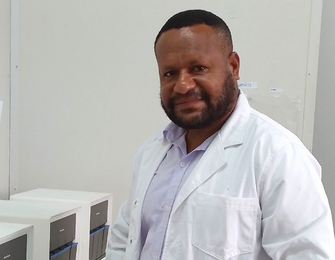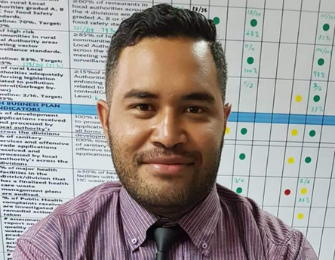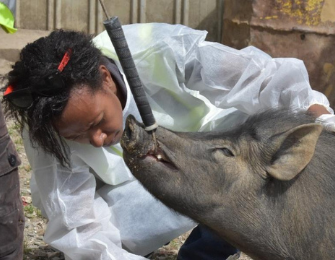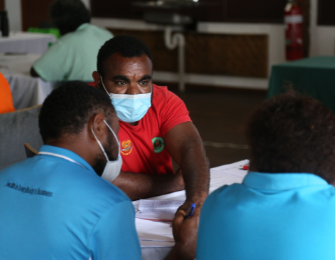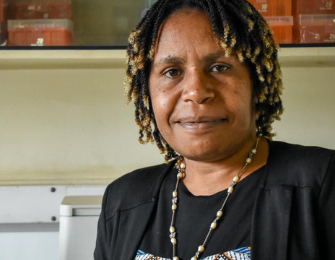
What is your current role?
I am currently the head of the Sexual & Reproductive Health Unit at the Papua New Guinea Institute of Medical Research (PNGIMR), where I have worked for the past 19 years. More recently, I have been appointed Laboratory Coordinator of Disease Outbreak Surveillance which has allowed me to be leading the COVID-19 Testing Laboratory Team at PNGIMR. PNGIMR and the Kirby Institute are long term collaborators.
Together, the PNGIMR and the Kirby Institute are implementing the Indo-Pacific Centre for Health Security’s ACTUP-PNG project which aims to accelerate the uptake of innovative technologies in HIV diagnostics and surveillance to address HIV drug resistance in adults and children. My role as lead PNG research investigator and project coordinator involves me liaising with key partners and overseeing on-the-ground establishment and delivery of point-of-care HIV viral load, early infant diagnosis and HIV drug resistance testing in two of the government’s largest sexual health clinics, located in Mount Hagen and Port Moresby.
What drew you to work in the area of HIV and HIV drug resistance?
I first learnt about HIV when I was attending the University of Papua New Guinea in the early 2000s studying for a Bachelor of Natural & Physical Science. Back then people were referring to HIV as binatang nogut and to AIDS as sik nogut, both of which imply that it’s a bad infection or disease, with sik nogut specifically making a moral judgement about those infected. There was a great deal of stigma and discrimination associated with HIV at that time. Most people who were infected with HIV developed AIDS and died as a result. Antiretroviral therapies were only introduced into PNG in 2004 and at the time were restricted to the National Capital District. I was curious about HIV. I wanted to study the virus and how it worked. It was through my years working with on several different HIV-related projects that I developed a special interest in HIV treatment and drug resistance. This led me to undertake a doctorate in that specific area and I attained a PhD in Biomedical Science from Monash University in 2015.
Why is a response to HIV drug resistance in Papua New Guinea important for health security?
PNG has the highest burden of HIV in the Pacific region. It is rated one of the top five countries with the highest levels of HIV drug resistance in treatment-naïve people (people who have not yet started taking antiretroviral therapies). Anti-microbial drug resistance is a significant global health security threat including for PNG, and this includes HIV drug resistance. Our borders are open to international travel and traditional border crossings happen daily with neighbouring countries (Australia and Indonesia). Papua New Guineans are travelling overseas, and we have foreigners travelling to PNG. Programs that are aimed at containing HIV infections and minimising the spread within the country and across the borders are vital for PNG. So too is ongoing HIV drug resistance surveillance.
What are some of the challenges you face in your work with ACTUP-PNG?
Processes around central procurement, supply continuity and stock levels of testing reagents and basic blood drawing instruments required in sexual health clinics and laboratories are the areas which our team is focusing on now to avoid disruptions in service caused by stockouts at the central level. The point-of-care HIV viral load testing and early infant diagnosis services are new to many HIV patients, but also to the clinicians and laboratory staff. Patients are accustomed to needing to wait several months for their next follow-up clinic visit to receive their viral load test results, but with ACTUP-PNG, all test results are available on the same day. We are finding that patients are still returning home without waiting for their results, as they are not used to such a short wait time. Unfortunately, this can leave patients with a high viral load result unmanaged for several months. We are working to educate clinicians and patients about the value and purpose of ACTUP-PNG’s point-of-care services and the benefits of timely results to ongoing management and treatment including critical adherence counselling. We are encouraging patients to wait for their results if it is feasible for them and we are confident that new routine behaviours will develop.
What is most rewarding about your work with ACTUP-PNG?
The most rewarding part of my work with ACTUP-PNG are the stories I hear from clinicians of patients’ faces lighting up with joy when they learn that their HIV viral load is low or suppressed. They feel encouraged that the treatment they are taking is effective and suppressing the virus in their body. What will be the impact of ACTUP-PNG on people’s lives and national health system policies? A national study, which I led, showed very high levels of drug resistance in people initiating HIV treatment in PNG and as a result the government changed its first-line treatment for HIV. ACTUP-PNG will enable us to continue to invest in HIV drug resistance surveillance. Through ACTUP-PNG, we will be able to establish routine HIV drug resistance surveillance on newly-diagnosed people and those about to start treatment, as well as those who are on treatment but whose viral load is not being suppressed.
Outside of ACTUP-PNG, no one in PNG can access HIV drug resistance testing, so this project will play an important role in our national response to HIV as well as health security going forward. The model we are testing brings the viral load test to the clinics at the point-of-care so that results are given to the patient by the health care worker on the same day. The results will enable the clinicians to effectively manage and monitor their patients for the development of HIV drug resistance.
For the patients, same-day results mean a shorter waiting time, less travel, and by giving them the knowledge of what is happening with the virus in their body, they will be able to make informed decisions on their treatment adherence practices and future health care plans. Generally, patients with low or undetectable viral load will feel better knowing that the virus is kept at bay and that they will live a normal and healthy life. The qualitative component of the project will assess the acceptability and feasibility of this model to guide health system policies to better manage our HIV patients to avoid the development of drug resistance.
Why are you passionate about what ACTUP is working to achieve?
I am optimistic that through ACTUP-PNG we will demonstrate that we can improve clinical management of people with HIV when viral load testing and HIV drug resistance monitoring is provided as part of routine HIV treatment and care services in PNG. Critically, through this project we are building the capacity of the laboratory workforce and strengthening the policy environment so that we can establish best practice HIV drug resistance surveillance and sustain our work into the future. And of course, as the threat of anti-microbial resistance places a great burden on health security, we are making a vital contribution to the reduction and containment of HIV drug resistance in PNG. I would like to acknowledge and thank the Australian Government and specifically the Indo-Pacific Centre for Health Security for funding the ACTUP-PNG project. I am grateful for the enormous support we are receiving to monitor HIV drug resistance over the next couple of years.
Learn more on the ACT-UP project page.
Listen to the Contain This podcast with Dr Janet Gare.

